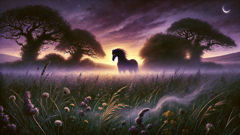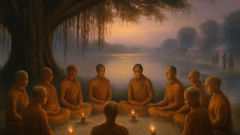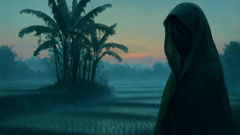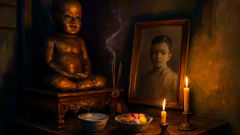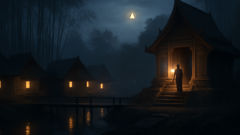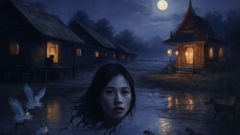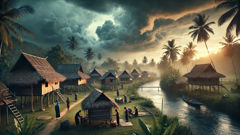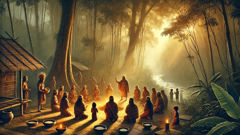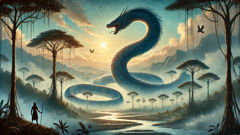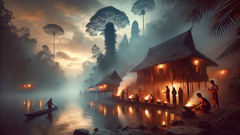Introduction
In the rolling emerald hills of County Clare, where the land folds into secret glens and wildflower meadows, the dusk has always carried stories. It’s in the hush after sundown, when mist crawls up from the bogs and the hedgerows shimmer with dew, that the boundaries between worlds grow thin. People say the earth remembers—each stone and twisted oak root heavy with tales of things seen and unseen. Here, belief in the uncanny is as much a part of life as the steady rhythm of rain on thatch. In every hamlet and homestead, folk whisper about the Puca: a creature older than memory, a trickster known to shift its shape with the fog. Sometimes it appears as a black horse with eyes like burning coals, or as a wild goat, or a hare that leaps and vanishes into bracken. Some say the Puca brings good luck—golden eggs in a hen’s nest, a bountiful harvest, milk that never sours. Others warn of rotten crops, lost travelers, and laughter echoing from empty fields. For centuries, farmers have left offerings at the edge of their land—ripe apples, crusts of bread, a cup of milk on a stone—hoping to appease this spirit of mischief and magic. But to truly understand the Puca, you must listen not only to the old stories, but to the land itself: to the wind that whispers through hawthorn branches, to the hush that falls when a shadow flickers across the moon. In one such village, nestled by a river that gleamed silver at twilight, a girl named Aisling lived at the edge of the wild. Restless and curious, she longed to know if the legends her grandmother told were true. When fate—and the Puca’s whim—crossed her path, Aisling found herself swept into a night of riddles, enchantment, and the kind of wisdom that only comes from meeting the uncanny face-to-face. This is the story of that meeting: a legend about luck, courage, and what it means to see beyond the surface of things.
Aisling’s Curiosity and the Edge of the Wild
Aisling had always felt the tug of the unknown. She lived with her grandmother in a stone cottage where the brambles crept close to the doorstep and the river’s song was never far off. Her world was stitched together from ancient hedges, crumbling stone walls, and the smoky blue-green of distant hills. Each night, her grandmother spun tales by the fire—stories of banshees, selkies, and, most often, the Puca. But while her grandmother spoke with the weight of warning, Aisling’s mind fizzed with excitement. She wasn’t afraid of the Puca; she was fascinated.
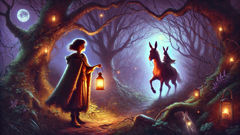
One October evening, as Samhain approached and the veil between worlds was said to grow thin, Aisling found herself wandering further than usual. The air was rich with peat smoke and the scent of fallen apples. Clouds shifted across a cold, full moon, draping the land in moving silver shadows. She followed the narrow path along the riverbank, fingers trailing through dewy grass, heart beating with the thrill of adventure. There was a hush in the air—a pause that seemed to vibrate with possibility. She remembered her grandmother’s warnings: “Don’t tarry after sundown. Don’t stray from the path. The Puca loves a curious soul.”
But curiosity was Aisling’s true inheritance. She pressed on until the path disappeared into a thicket of hawthorn trees. There, at the edge of the wild, she spotted something strange: hoofprints in the muddy earth, far larger than any horse’s, and yet impossibly light. The tracks twisted and doubled back on themselves, as if whatever made them couldn’t decide which direction to go. The wind shifted, carrying a sharp, sweet scent—like honey and smoke. Suddenly, a shape darted between the trees: black as night, quick as a hare, with ears too long for any goat and eyes that glimmered with sly amusement.
Aisling froze. The stories came rushing back—of travelers whisked onto wild rides through the night, of lost sheep returned with silver bells around their necks, of laughter that made milk sour and bread rise twice as high. Her breath misted before her. The creature stepped into the open—a horse, perhaps, but with a wild, tangled mane and a glint of something nearly human in its gaze. It regarded her with a tilt of its head, as if waiting for her to speak.
"Are you… the Puca?" she whispered. The creature grinned—a flash of too-white teeth. It bowed its head low, then flickered, shifting in the moonlight. For a moment, it became a massive black dog with golden eyes, then a goat with curling horns, then a tall, elegant hare that seemed to laugh without a sound. When it settled again as a horse, it stamped its hoof and nodded. The Puca.
Aisling felt neither fear nor awe, but a prickling sense of challenge. “If you’re the Puca,” she said, her voice steadier than she felt, “what do you want with me?” The Puca’s answer was a riddle: “Luck comes to those who dare to seek it. But do you know if fortune is friend or foe?”
With that, it whirled and galloped into the dark. Without thinking, Aisling followed. The world seemed to shift around her: familiar trees grew stranger, moonlight sharpened and changed color, and the path vanished beneath her feet. She was running not just into the forest, but into another realm—the wild domain of the Puca, where nothing stayed quite the same for long.
A Night of Riddles and Revelations
The forest was not as it had been. Trees leaned inward, their trunks twisting into faces that watched and whispered. A carpet of bluebells glowed faintly beneath Aisling’s feet, and brambles coiled away from her as if opening a secret passage. The Puca’s laughter rang through the air—sometimes close, sometimes impossibly far. "Catch me if you can," it called, voice lilting between mischief and melody.
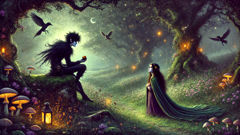
Aisling pressed on. Her heart pounded, not with fear but with exhilaration. She ducked beneath a tangled arch of rowan branches and found herself in a glade bathed in silver light. The Puca waited there, now shaped as a handsome young man with wild black hair and a coat that shimmered like crow feathers.
He sat on a mossy stone and beckoned her closer. “You’re braver than most,” he said, eyes twinkling. “But courage alone doesn’t win the favor of the Puca. Do you know the price of a wish?”
Aisling shook her head. “I haven’t made a wish.”
He smiled slyly. “But you’ve followed me. That counts for something.” He offered her a wooden cup filled with dark liquid. “Drink, and you’ll see as I see.”
She hesitated, remembering warnings about faerie food and drink. But her curiosity won out. She sipped. The taste was wild—berries and smoke, honey and winter wind.
The world spun. Colors sharpened. She saw tiny figures peering from tree roots—hedge sprites and will-o’-the-wisps. Owls winked from branches. Shadows danced and shifted. And everywhere, the Puca was present: as a ripple in the stream, a gust of wind, a shadow behind her shoulder.
“Now,” the Puca said, rising to his feet and growing taller, “solve my riddles. Answer them true, and fortune will favor you. Fail, and you may wander these woods until you learn wisdom or forget your name.”
He spoke three riddles:
“I have a face but no eyes, hands but no fingers. What am I?”
Aisling thought: “A clock.”
The Puca grinned and bowed.
“Second: I can be cracked, made, told, and played. What am I?”
“A joke,” Aisling replied, breath quickening.
“Well done.”
The third riddle came softer: “You’ll find me once in the morning, twice in the evening, but never in the day. What am I?”
She puzzled, counting letters in her mind. “The letter E,” she said at last.
The Puca laughed—a sound like chimes on the wind. “You’re cleverer than you look.”
With each answer, the glade changed shape: flowers bloomed and withered; trees grew tall, then shrank into saplings. The Puca tossed her a golden apple. “Take this as my gift. But beware: what brings fortune may also bring trouble. You must decide how to use it.”
Aisling turned the apple in her hands. It shimmered with unearthly light. She knew instinctively that this gift came with a choice. “What should I wish for?” she asked.
“That is not my answer to give,” said the Puca, shifting now into a great black stallion. “Wish wisely, girl of the wilds. And remember: the Puca’s blessing cuts both ways.”
With a toss of his mane, he vanished into the mist, leaving Aisling alone beneath the moon.
The Price and Power of Fortune
With the Puca gone and dawn still hours away, Aisling wandered the forest, clutching the golden apple. The trees seemed less menacing now—more curious than threatening. She wondered what to wish for: riches for her family? An end to hardship? A glimpse into the future? Each possibility carried its own weight. The apple grew warmer in her palm, pulsing like a heartbeat.
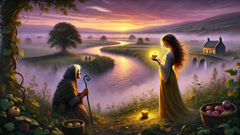
As she walked, creatures of the night watched from the shadows: a fox with three tails, a badger wearing a crown of ivy, a raven that called her name. She began to sense that she wasn’t alone—not just with the creatures, but with the forest itself. Every step felt chosen, every twist in the path both an invitation and a test.
She reached a clearing where the river curved in a silver arc. Mist drifted above the water, and on its far side stood her grandmother, leaning on a hazel staff. “You’ve wandered far, Aisling,” she called softly. “What have you found?”
Aisling crossed the stream, holding out the apple. “A gift from the Puca. But I don’t know what to wish for.”
Her grandmother smiled—a knowing, bittersweet curve of her lips. “The Puca gives what you think you want, but not always what you need. Wishes are tricky things. Do you seek fortune for yourself, or for others? Do you wish for ease, or for wisdom?”
Aisling looked at her reflection in the river. She saw herself—a girl on the edge of childhood, hair tangled with leaves, eyes bright with questions. She remembered all the people in her village: the tired farmer with the lame horse; her friend whose father had been lost at sea; the children who went to bed hungry when the harvest failed.
She turned the apple over. It was perfect—smooth, glowing, tempting. She realized the wish wasn’t just for her. Maybe fortune was best when shared.
Taking a deep breath, she spoke aloud: “I wish for enough—enough food for every table, enough health for every home, enough hope for every heart.”
The apple dissolved into golden mist, drifting over the water. The air filled with the scent of new grass and wildflowers. Somewhere in the trees, the Puca laughed—a sound both mocking and approving.
Aisling’s grandmother drew her close. “That’s the wisdom of the old tales: luck isn’t something you keep for yourself. It’s something you give away.”
As dawn painted the sky pink and gold, Aisling and her grandmother walked home. In the days that followed, odd things happened in the village. The hens laid double eggs; a lost lamb returned; the fields yielded enough to fill every larder. People muttered about luck and left extra offerings at their doorsteps—just in case. But Aisling knew that real fortune wasn’t in gifts or gold—it was in seeing beyond yourself, in meeting the wild with courage and choosing kindness over greed.
Sometimes at dusk, when the wind changed or a black horse grazed at the edge of the meadow, she would hear the Puca’s laughter again. She would smile and whisper thanks—not just for luck, but for the lesson that fortune is always shaped by what you do with it.
Conclusion
So ends the tale of Aisling and the Puca—a legend woven into the hush of Irish twilight, where every shadow might be a trickster waiting to test your heart. For generations after, people in that part of County Clare remembered how, one year, luck seemed to flow like rain after a drought. They’d tell their children how a girl with more curiosity than fear met the old spirit of fortune and mischief in the woods and learned that wisdom lies in selflessness. The Puca still roams the wild places: in shifting forms, it teases and challenges any who dare to follow after dusk. It reminds us that luck is never simple; it’s shaped by our choices and shared in the way we live. If you ever walk an Irish path as twilight falls, listen for laughter in the wind or hoofbeats that vanish without a trace. Remember Aisling’s wish, and know that real fortune favors not just the bold, but those wise enough to share what they’re given.

